The Size of the Baby Koala Joey at the time of its Birth
A baby koala joey at the time of its birth is nothing more than merely the size of a jelly bean. In fact; the koala joeys are one of the smallest mammals at the time of birth. Furthermore; most of the babies of the marsupial animals are also one of the smallest ones as well. A baby koala joey or a new born koala joey at the time of its birth is usually called neonate.
A koala joey at the time of its birth is nothing more than a size of a jelly bean. Its length is in between 16 to 21 millimeters which is hundreds of times smaller than an adult koala.
The observers who have measured the sizes of the koala joeys (neonates) at the time of birth counted them to be around 16 millimeters to 21 millimeters in lengths. This is a very small size for a baby who grows up reasonably big enough to become the biggest arboreal animal of the Australian continent. It wouldn't be wrong to conclude that a koala joey at the time of its birth is 100s of time smaller than the size of its mother or an adult koala.
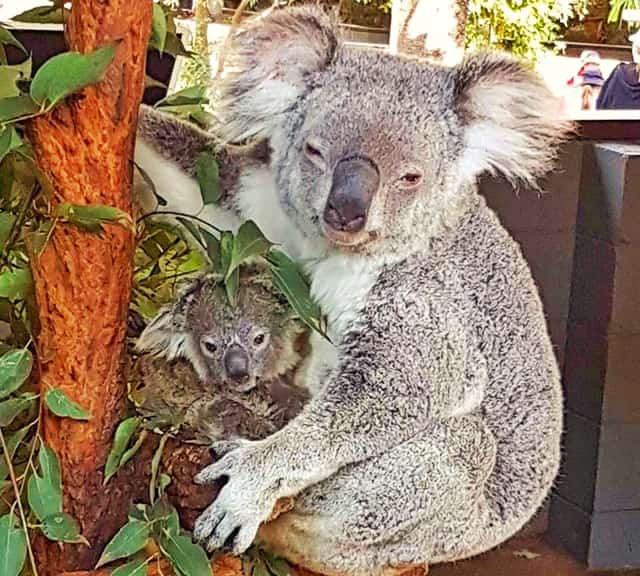
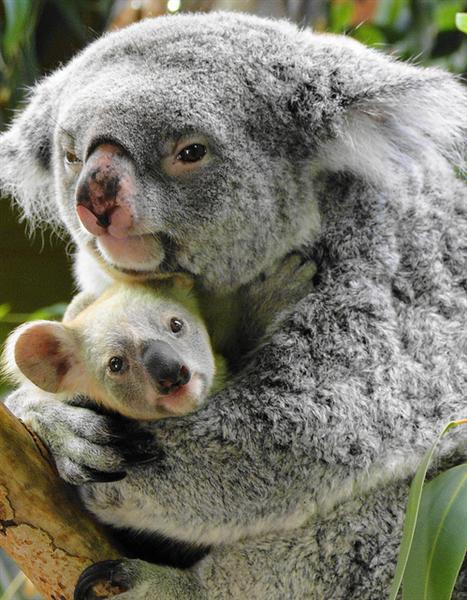
The tiny 21 millimeters sized koala joey at the time of its birth is very wet and does not possess any hair on its skin. A normal person may not be able to recognize if this small joey belongs to a koala. At the time of its birth, the koala joey has very small under-developed forelimbs while its hind limbs are not even developed yet.
The tiny-sized koala joey at the time of its birth has under-developed legs, eyes, face and nose etc. It doesn't have any hair on its skin.
At this stage the eyes of this neonate koala joey are under the development phase and they appear nothing more than just the two black spots on its nakedly red & brown slime looking skin. Its head and nose areas also remain in the development phase but they remain recognizable too. Therefore; the koala joeys at the time of their birth are not only tiny but are also un-recognizable.
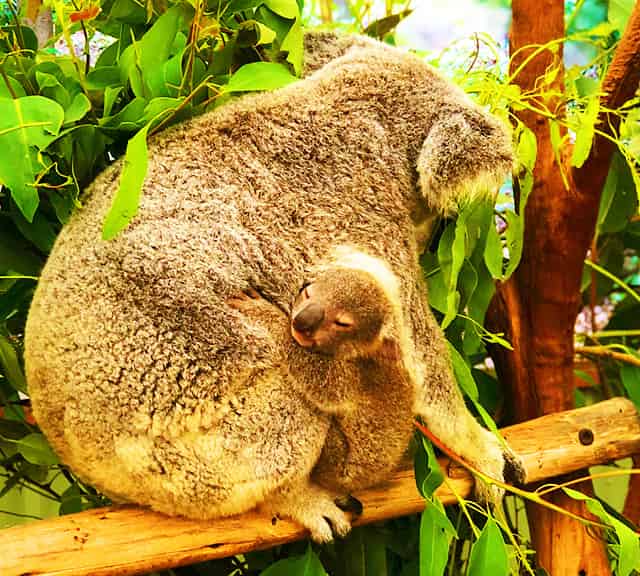
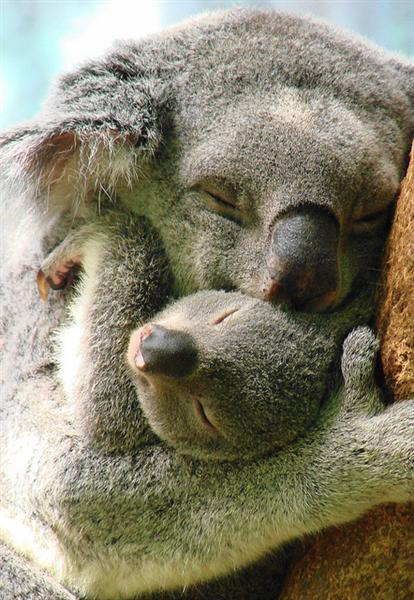
Even though the size of the baby koala joey is very small at the time of its birth, it still has enough power to make a small journey for its own protection. Remember the koala joeys are not born inside their mother's pouch, therefore; they have to reach the pouch for their survival and future growth. Therefore; this tiny koala neonate travels from the cloacae opening to the pouch of its mother.
The small-sized and under-developed koala joey makes a small journey from the cloocae opening to the pouch of its mother. It uses its forelimbs to climb up to the pouch.
Its mother doesn't offer any help at this time and the tiny koala joey has to use its small forelimbs to climb up towards the pouch of its mother. It enters the pouch of its mother from the lower opening and grabs the teat of its mother and onwards start feeding on its mother's milk.
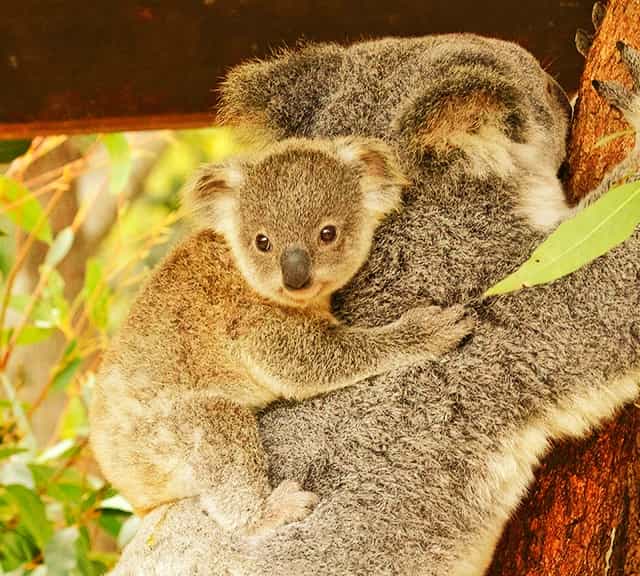
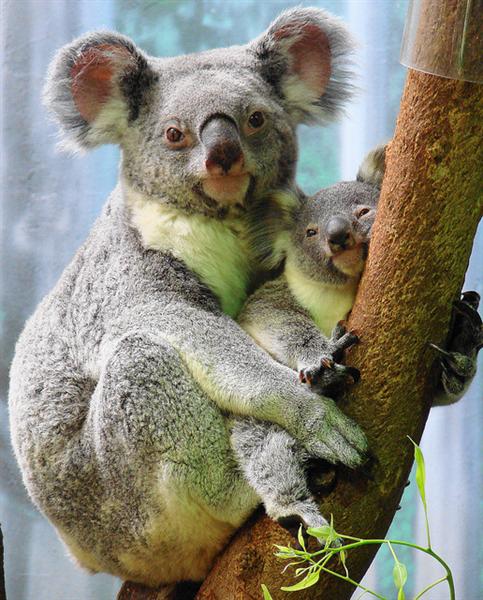
Inside the pouch of its mother, the actual body development of the neonate koala joey takes place and onwards it transforms itself into an adorable koala looking joey. The little joey feels warm and safe inside and it is a matter of couple of months before it moves out of the pouch of its mother. The mother feeds her all the time and it gains all the necessary nutrients from its mother's milk.
The mother's pouch is the new womb for the koala joey because this is where all the physical development of a koala joey takes place.
Even this bean-sized koala joey does all the fecal discharge in her mother's pouch and her mother tends to clean her pouch from time to time as well. Therefore; pouch is the new womb for this tiny-sized koala joey at the time of its birth.
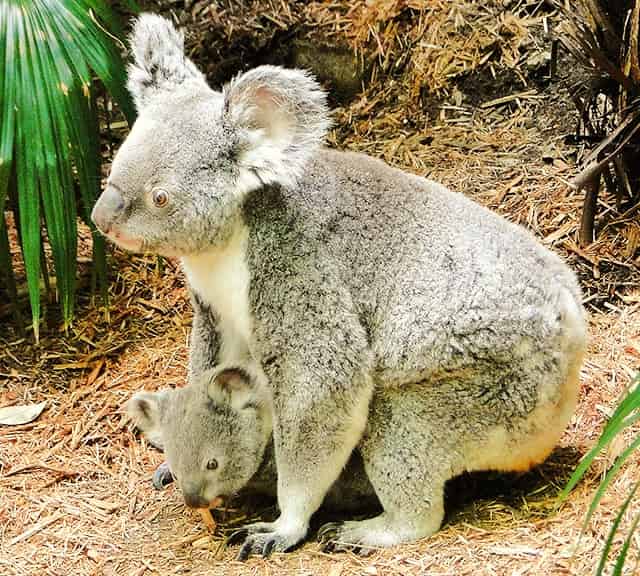
The difference in size between a mother koala and a neonate or a newborn koala joey is so huge that it is almost impossible to figure out that the mother koala has a baby in her pouch. Even though there are other medical methods to verify the pregnancy and birth of the female koala but in a normal routine you will never be able to figure out that the female koala is feeding a baby in her pouch.
The miniature koala joey is so small that it is almost impossible to identify that it is living inside the mother's pouch. Only after 6 months one realizes that the female koala was pregnant and gave birth to a koala joey.
It takes almost 4 to 6 months when you normally realize that the female koala has a baby. At this time the koala joey watches outside the pouch and has a reasonable body development. Onwards after 1 year, this small-sized koala joey becomes a juvenile koala and lives on its own.
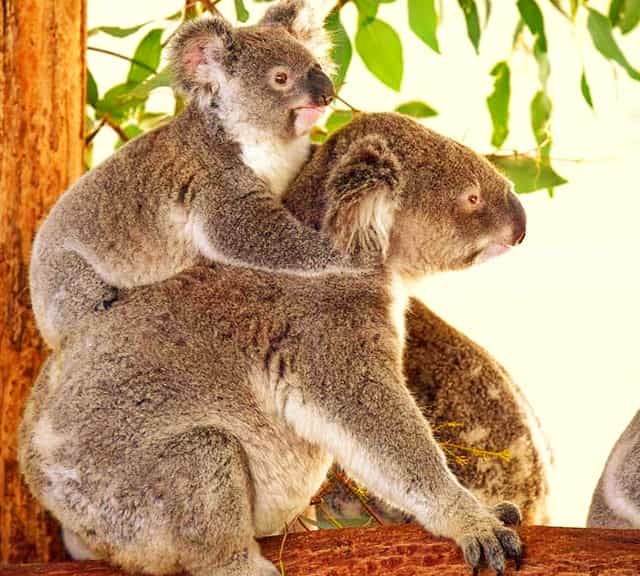
Koalas are not the only marsupials and even mammals that have extremely small babies at the time of the birth. In fact; many small marsupial animals such as kangaroos, wallabies, wombats and tree kangaroos etc. give birth to the miniature-sized baby joeys the time of their births. The babies of this group (marsupial mammals) are extremely under-developed that they almost remain unrecognizable.
The babies of many other marsupial animals such as kangaroos and wallabies etc. are also very small at the time of their births. Even Panda babies are an inch or two longer at the time of their births.
They live inside the pouch which serves as their second womb where the grow bigger and bigger until they become adults. Even within non-marsupial mammals such as pandas, the size of the baby is almost not more than 2 inches yet they become bigger and huge as adults.
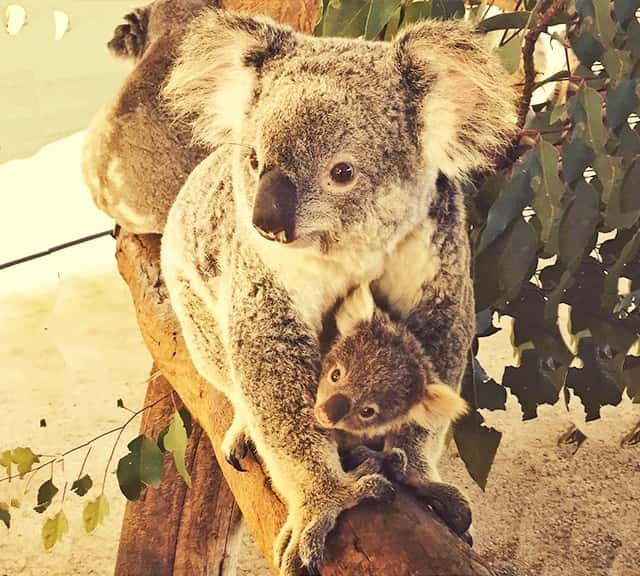
Liger Articles
Marsupials vs. Placental Mammals
Koalas are most popular animals in Australia
Koalas are more popular as compared to Kangaroos
Koalas and their Dominant Nose
Button Shaped Fascinating Eyes of the Koalas
Core Recognizing Features of Koalas
Koalas are the largest tree climbing Mammals in Australia - Koalas as Arboreal
Sizes of Koalas from Queensland, Australia
Sizes of Koalas from Australia's Victorian Origin
Difference between Queensland and Victorian Koalas
Average Weights of Male Koalas
Weighing Male vs Female Koalas
Male Koalas have Loudest of voice among all Australian Mammals
Origin of Koalas & their Evolution
Koalas Population Increased at the end of 20th century
Historical Evolution of the Koalas - A Physical Perspective
Koalas and their Aboriginal and Native Names
It Took 10 years for Aboriginal Australians to Spot and Recognize Koalas
Koalas Live Hardest and Toughest Lives Among all animals
Koalas Tooth Decay through its Abrasive Diet
Koalas Diet is Fully Poisonous and Toxic
Koalas' Food Eucalyptus has Lower Nutrition
Koalas have Lower Energy Levels
Koalas - When Occasionally Spotted on other Leaves for their Food
Why Koalas drink little or no Water?
Koalas & their Advanced Digestive Mechanisms
Why Koalas Sleep more than 20 Hours a Day?
Koalas Lack Energy and Strength
Koala's Tooth from Growth till Tooth Decay
Young Koalas are Better Chewers as Compared to Mature and Elderly Koalas
Why Most Koalas Die of Starvation?
Heat Exhaustion and Heat Strokes among Koalas
Do Koalas lack Intellectual Abilities?
Koalas and their Sense of Smell
Koalas Love Fresh Eucalyptus Leaves as their Food
Koalas' Eucalyptus Leaves' Preferences during summers and Winters
Koalas' Preference for Leaves Having Higher Nitrogen Levels
Koalas Prefer Big Eucalyptus Trees and Love to Stay at Trees' tops.
Koalas Prefer to Live in Areas that have Good Soil and Fertile Lands
Koalas' Per Day Food Consumption
Koalas Food Consumption Depends upon their Body Size
Lactating Female Koalas Consume More Food as Compared to the Normal Female Koalas
Koalas Consume More Food during Winters as Compared to Summers
Female Koalas are very Selective Regarding their Leaf Selection and Food Consumption.
A Baby Koala Joey Lives in her Mother's Pouch for 8 to 9 Months
Gestation Period within Female Koalas
Breeding Behaviors of the Female Koalas
The Size of the Baby Koala Joey at the time of its Birth
Weight of the Baby Koala Joey at the Time of its Birth
At Birth the Baby Koala Joey Travels from Cloaca into their Mother's Pouch
Newborn Koala Joeys have Well-Established Sense of Smell
Koala Joey keeps his Head Inside its Mother's Pouch for 6 Months
Complete Shape and Body Development of the Koala Joey
Pap - The first solid food of the Koala Joeys
When Does Tooth Emerge for Baby Koala Joey?
Aggressive Behavior of Mother Koalas towards their Joeys
Queensland Offers Less Nutritional Values for Koalas
How long does Koalas live? Age of the Koala
Female Koalas Live More than Male Koalas
What is the Average Age of the Male Koala?
Average Ages of the Female Koalas
For How Long a Female Koala can Give Birth to the Koala Joeys?
How many times female Koalas give birth?
Koalas and Australia's Bushfire
Koalas' fur quickly gets rid of rain water
Koalas Resting and Sleeping Postures and Positions during the Hot Summer Seasons
Winter Season and Sleeping Postures of Koalas
Koalas' Urination during Summer and Winter Seasons
Koalas and their Specialized Claws
How does a Koala regulate its Body Temperature?
Food Consumption and Feeding Timings of the Koalas
Koalas Always Prefer Eucalyptus Leaves from the Tree top
How does a Koala Grooms itself?
Koalas' Territories and ranges within Australia's Victorian Areas
Koalas' Territories and Ranges within Australia's Queensland Areas
Behavior of the Alpha Dominant Male Koala
Aggressiveness of Female Koalas
Scent Marking Behavior of the Male Koalas
Mating Strategy of the Male Koalas
Fights and Territorial Encounters of Male Koalas
Sounds and Vocalizations of Male Koalas
Sounds and Vocalization of the Female Koalas
Koalas and their Facial Expressions
Breeding Ages of the Male and Female Koalas
Factors Influencing the Success of Koalas' Fertility Rates
Behavior of the young and adolescent Koala Joey
When Does a Mother Koala Says Goodbye and Leaves the Young Koala Joey?
Playful Behavior of the Young Koala Joeys
Koalas - Mating Season and Mating Months
Koala Informationen, Bilder, Neuigkeit, und Erforschung
Коала - сумчатый млекопитающий